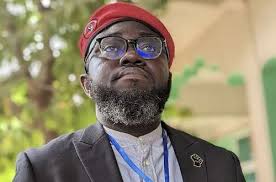Oliver Barker-Vormawor, a prominent activist and lawyer, became embroiled in controversy following his arrest during a protest against illegal mining in Ghana, locally known as “galamsey.” Organized by the Democracy Hub, the protest sought to draw attention to the significant environmental devastation resulting from such mining activities. Unfortunately, Barker-Vormawor’s activism took a perilous turn when he was reportedly assaulted by eight members of the Ghana Police Service’s SWAT team while in custody. His friend, Mawuli Dake, provided an alarming account of this incident, indicating that Barker-Vormawor was physically hurt and emotionally shaken but remained “in high spirits.” The fear surrounding his well-being has heightened concern among his family and supporters, especially his worried mother, who questions the ongoing risks he faces while in police custody.
Despite the traumatic experience of being assaulted, Barker-Vormawor was granted bail on October 16, after multiple failed attempts. His previous applications for bail had been denied by both the Accra High Court and the Circuit Court. According to Dake’s updates, Barker-Vormawor was initially held at the Regional Police Headquarters, where the violent encounter with the SWAT officers occurred. After the incident, he was taken to a private hospital for treatment of his injuries and was later transferred to the Dansoman SSNIT Police Station. The medical attention he received included a doctor’s prescription for medications, which the police failed to provide. Dake took it upon himself to obtain the necessary medications for Barker-Vormawor, highlighting the lack of support from the police during this distressing time.
The events surrounding Barker-Vormawor’s arrest are deeply entwined with the larger issue of environmental degradation due to illegal mining in Ghana. The protest he participated in involved approximately 55 activists rallying against the exploitation of Ghana’s natural resources. While the police have stated that Barker-Vormawor was detained for unlawful activities during the protest, specific details of any alleged misconduct are still being investigated. His actions during the protest included removing keys from a police van, which contributed to the charges against him. Yet, it is evident that his commitment to advocating for environmental reform and accountability remains steadfast, even amidst these challenges.
Mawuli Dake has taken to social media to provide public updates regarding Barker-Vormawor’s condition following the assault. His disturbing account outlines the events that led to the physical attack, emphasizing the severity of the situation as he raises questions about police accountability and the safety of activists in Ghana. The incident has ignited calls for immediate explanations from the Ghana Police Service regarding this assault. Dake’s detailed accounts, which also include his personal visits to Barker-Vormawor in custody, serve to underscore a critical narrative about the intersection of activism, police brutality, and human rights in the country.
The implications of Barker-Vormawor’s case extend beyond just his personal ordeal; they highlight significant concerns regarding the safety and treatment of activists within Ghanaian society. Dake poignantly captures his own worries and those of Oliver’s mother, questioning the potential for further harm against Barker-Vormawor, particularly in light of the brutal assault he endured. The fear over his safety while being isolated in a police cell raises serious apprehensions about the integrity of law enforcement and the systemic challenges faced by those who speak out against environmental injustices. This situation illustrates the broader societal tensions surrounding environmental activism in a country facing severe ecological threats.
Despite the adversities faced, Barker-Vormawor continues to embody hope for transformative change in Ghana. His belief in the possibility of a nation where freedom, justice, and dignity prevail for all serves as an inspiration amidst the challenges. The public’s response to his plight and the ongoing dialogues surrounding police violence and environmental advocacy will likely shape the future of activism in Ghana. As the country grapples with these pressing issues, the calls for accountability and reform become increasingly vital to foster an environment where activists can operate without fear of violence or persecution. The trajectory of Barker-Vormawor’s case not only exposes the harsh realities of dissent in Ghana but may also illuminate a path forward for change in the fight against corruption and environmental degradation.


